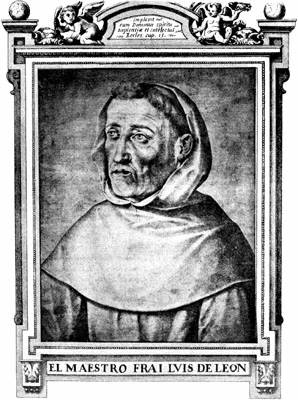HISPANIC
NOTES & MONOGRAPHS
ESSAYS, STUDIES, AND BRIEF
BIOGRAPHIES ISSUED BY THE
HISPANIC SOCIETY OF AMERICA
I
FRAY LUIS
DE LEON
A Biographical Fragment
BY
JAMES FITZMAURICE KELLY, F.B.A.
With a Portrait from
an engraving after Pacheco
OXFORD UNIVERSITY PRESS
HUMPHREY MILFORD
1921
PRINTED IN ENGLAND
AT THE OXFORD UNIVERSITY PRESS
BY FREDERICK HALL
PREFACE
This biographical sketch is, in fact, a fragment of a book whichwill now never come into existence. This particular chapter has beensnatched from the burning by an accident. The name of Luis de Leondeservedly ranks as high as that of any poet in the history of Spanishliterature; but his reputation as a poet is mostly local, while he isknown all the world over as the subject of a dubious anecdote. Theattempt is now made to render him more familiar than he has hithertobeen to English-speaking people, and to do this, to exhibit the man ashe was, it proved necessary to analyse the two volumes of his firsttrial, the evidence of which is brought together{vi} in vols. X and XI ofthe Coleccion de Documentos inéditos para la Historia deEspaña. Edited by Miguel Salvá and Pedro Sainz deBaranda, these volumes appeared in 1847; their value is incontestable,but, though they give the evidence as it occurs in the register of theInquisition, this evidence is not arranged in consistent chronologicalorder, nor is it supplied with an index. The work, printedseventy-three years ago, is not within easy reach of every reader; andof those who have access to it not all are patient enough to readsteadily through so large a mass of somewhat incoherent matter. Shouldany such readers be tempted to examine the record closely, it is hopedthat this sketch will do something to make their task easier. Anattempt is made here to picture the man as he was, full of fortitude,yet not exempt from human weakness. I trust that I have avoided thetemptation to go to the opposite extreme, and lay the blame—as{vii} has beendone—for the irregularities of the trial at Luis de Leon's owndoor.
In dealing with his Spanish poems, I have tried not to put hisclaims to consideration too high. Laboulaye, in La Libertéreligieuse, calls Luis de Leon 'le premier lyrique de l'Europemoderne'. This phrase dates from 1859, and was addressed to ageneration which delighted in arranging authors in something like theorder of a class list. Though I have the highest opinion of Luis deLeon's genius, I have not felt tempted to follow Laboulaye's example;I have by preference discussed, so far as space allows, such points asthe probable chronology of
